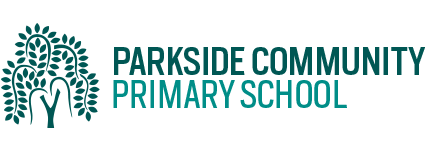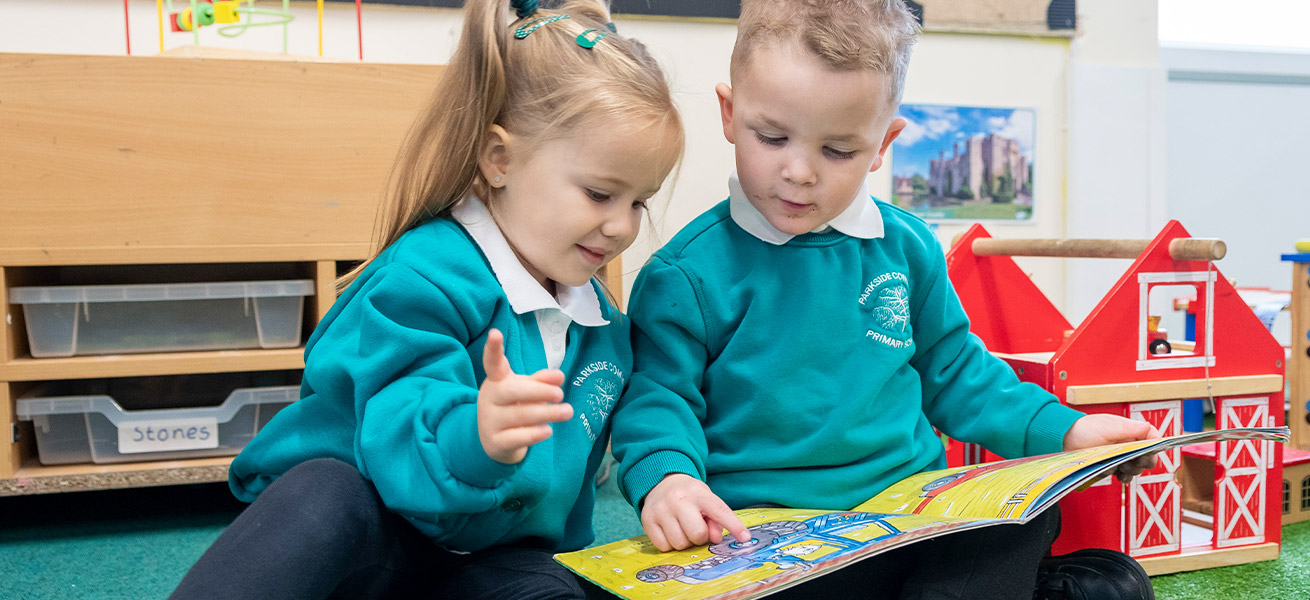Reading
At Parkside Primary School reading is an integral part of the school curriculum that impacts on all learning. As a staff ,we value the importance of children being confident readers and work hard to develop their reading skills across all areas of the curriculum. We want children to enjoy reading across a wide range of genres and be able to talk about books and authors with confidence and enthusiasm.
World Book Day 2025
Can you work out who is behind the mask? In the box, write the name of the member of staff you think it may be. You can download the answer sheet below to fill out your ansewrs!
NEW! Friday 14th March: Answer sheet and event video below!
Reading at Parkside
We teach reading from Foundation Stage to Year 6. This can be in the form of one-to-one reading with an adult, shared reading, guided reading sessions and independent reading. In Foundation Stage and Key Stage 1 we teach synthetic phonics and use the Monster Phonics reading scheme to support this. As part of this scheme, children will bring home a Monster Phonics ‘Book Bag Book’ matched to their ability. Children are continually assessed until they reach the required standard to become a free-reader, choosing a book to read from our well-stocked school or class libraries. In Key Stage 2, children partake in whole class guided reading. In these sessions, there is an emphasis placed on developing children’s vocabulary, comprehension and fluency. Children are encouraged to read from a wide range of fiction and non-fiction books.
All children take books home to read with an adult; this shared learning will help children to practice their reading skills and develop a lifelong love of reading.
As well as teaching the skills necessary to become confident readers, we have our own library full of exciting books written by acclaimed and highly regarded authors.
The Teaching of Reading in EYFS and Key Stage 1 – Monster Phonics
Reading
When using Monster Phonics to read the children will:
- Learn 44 sounds and the corresponding letter/letter groups using simple prompts
- Learn to read words using sound blending
- Read lively stories featuring words they have learnt to sound out
Writing
When using Monster Phonics to write the children will:
- Learn to write the letter/letter groups which represent the 44 sounds
- Learn to write words by saying the sounds and graphemes
Talking
When using Monster Phonics the children will also work in pairs:
- To answer questions
- To take turns talking and listening to each other
- To give positive praise to each other
Reading for enjoyment
We try to encourage a love of reading by holding book themed days and events both as individual classes and across the whole school eg World Book Day. We are developing links with Borehamwood Library and all children are encouraged to participate in the summer reading challenge. Reading assemblies take place regularly, which introduce children to a variety of literature. Book Fairs are held twice a year to allow all children the chance to look at new books of all genres and hopefully purchase a new book of their own to take home. Our well-stocked school library promotes authors and a range of reading material to appeal to all pupils.
Guided Reading
Guided reading forms an important part of the curriculum and is taught daily for 30 to 45 minutes. Children read from the same text and the teacher focuses on developing a specific reading skill and the acquisition of new vocabulary. Whole-class reading sessions also mean that children of all attainment bands share the same high-quality literature and actively participate in discussions that these texts promote.
Crucial elements to success are:
- All children read together in mixed-attainment pairs to allow for frequent, paired discussion. As a result less confident readers are exposed to the high-quality reasoning of more confident readers and become part of these discussions. The carefully chosen texts provide a clear challenge for all members of the class.
- Teachers model good use of intonation, movement, pitch and volume.
- Teachers actively monitor pace, so as to ensure high levels of engagement throughout the lesson.
- Teachers use targeted and open-ended questioning to elicit understanding from the children.
Targeted questioning is not only good for Assessment for Learning but also a good way to ensure all children engage with the lesson – if they don’t know who will be asked to provide a response, then they are more likely to consider the teacher’s question and make good use of the relationship they have with their talking partner.
- All follow-up tasks are carefully structured to provide challenge for all learners of all abilities which are clearly supported for those who need it.
Assessment, recording and reporting
- Informal assessment of children’s reading is continuous through listening to individual readers, group reading and reading across the curriculum in other subjects.
- Children have an individual reading book that reflects the stage of their development which is used in individual reading sessions to assess progress and to highlight next steps for learning.
- Formal assessments are completed at regular intervals throughout the year. Years and 6 sit the SATs Reading Tests in the summer term.
The Book Trust
To support your child’s reading and sharing a book with a child them can be a great deal of fun. It’s a time for closeness, laughing and talking together. You can also view the Reading With Your Child booklet translated into 26 other languages. CLICK HERE
Monster Phonics
For further information about why reading is so important please click on the following links.



